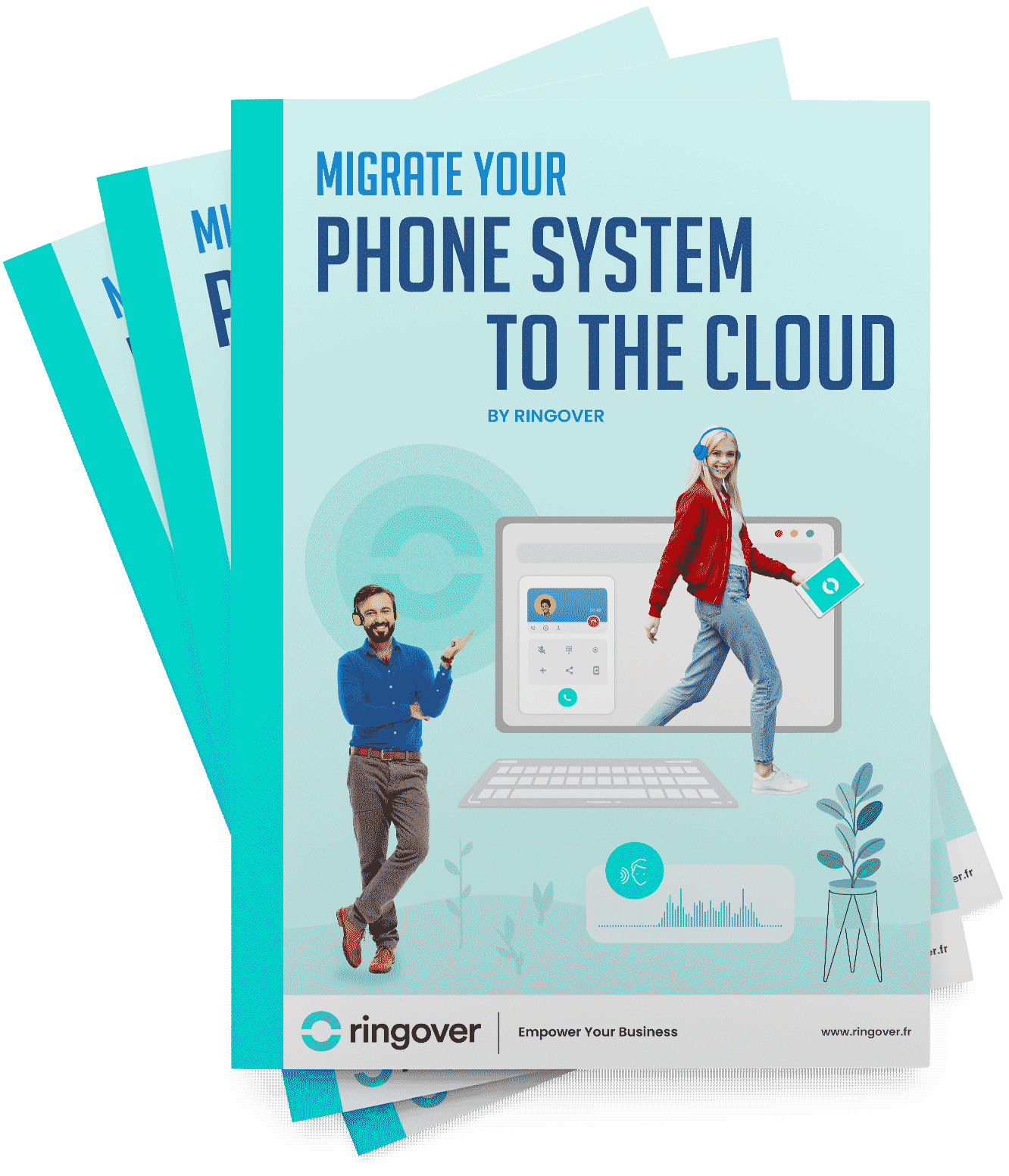Summary
In the dynamic and ever-evolving landscape of unified communications, businesses are perpetually searching for enterprise communications options that not only meet their immediate needs but also scale with their ambitions. Sangoma has carved out a significant niche in this space, particularly recognised for its open-source solutions like FreePBX and Asterisk [3].
While Sangoma presents an option for many, its complexity, pricing structure, and focus on technically adept users can lead businesses to search for a Sangoma alternative. This article will explore the 10 best Sangoma alternatives, providing the clarity needed to make a decisive and informed choice for your organisation's communication future.
Top 10 Sangoma Alternatives at a Glance
| Software | Key Features | Best For | Starting Price (Monthly Billing) |
|---|---|---|---|
| Ringover | Unlimited international calling, analytics, integrations, AI summary and transcription | Sales, support, and recruiting & staffing teams focused on growth | £24/user/month |
| 8x8 | Unified voice, video conference, chat, and contact centre (UCaaS & CCaaS) | Large enterprises with complex needs | Price on request |
| RingCentral | Messaging, video conference, phone, integrations | Businesses of all sizes | $30/user/month |
| Nextiva | VoIP software and basic CRM features | Businesses prioritising customer support | $23/user/month |
| Dialpad | AI transcription and sentiment analysis | Teams seeking AI features | £22/user/month |
| Vonage | Unified communications, contact centre, and programmable APIs | Businesses needing custom communication workflows | £10/user/month |
| Mitel | On-premise, cloud, and hybrid phone systems | Organisations requiring physical hardware and hybrid setups | Custom |
| CloudTalk | Call centre software with call queuing and skill-based routing | Small to medium-sized sales and support teams | $30/user/month [4] |
| Ooma | Affordable hardware and software bundles | Small businesses needing a simple, low-cost solution | $20/user/month [4] |
| 3CX | Open-platform IP PBX software | Technically proficient businesses wanting full control | Software is free, but you'll pay hosting & SIP trunking costs |
*Prices last updated November 2025. If prices are in USD, they are not listed in GBP on the software website.
The 10 Best Sangoma Alternatives in 2026
1. Ringover
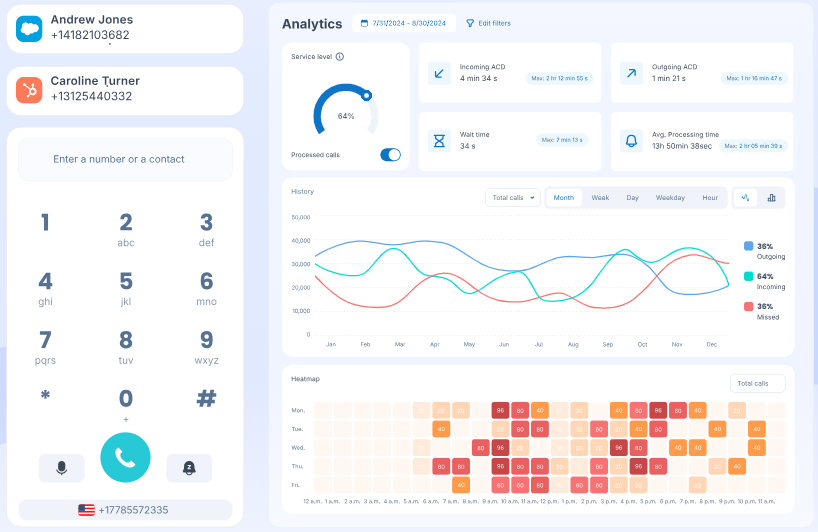
Ringover emerges as a premier Sangoma alternative, offering a comprehensive business phone system with the option to add a conversational AI platform. Meticulously engineered for modern sales and support teams and recruiting/staffing agencies, Ringover has an intuitive interface and created three pricing plans tailored to businesses of all sizes.
Ringover's hallmark is a seamless user experience, allowing for setup in minutes without sacrificing power. Key features include unlimited calling to over 110 destinations, an advanced IVR system for sophisticated call routing, comprehensive call recording, and powerful analytics that turn conversation data into actionable insights. Plus, the AI-powered call summaries and transcription help you break open the black box of client and prospect interactions, so you can easily spot opportunities and points of improvement.
As you explore various Ringover alternatives, you will find its combination of features and value is uniquely compelling.
Ringover Advantages
- Unlimited calling to a vast range of international destinations is included in standard plans.
- All-inclusive, transparent pricing plans eliminate hidden fees and budget surprises.
- Extensive, pre-built integrations with popular CRM and helpdesk platforms boost productivity, including popular options with Salesforce, Hubspot, and Zendesk.
- AI-powered features provide call transcription and summaries to all users.
2. 8x8
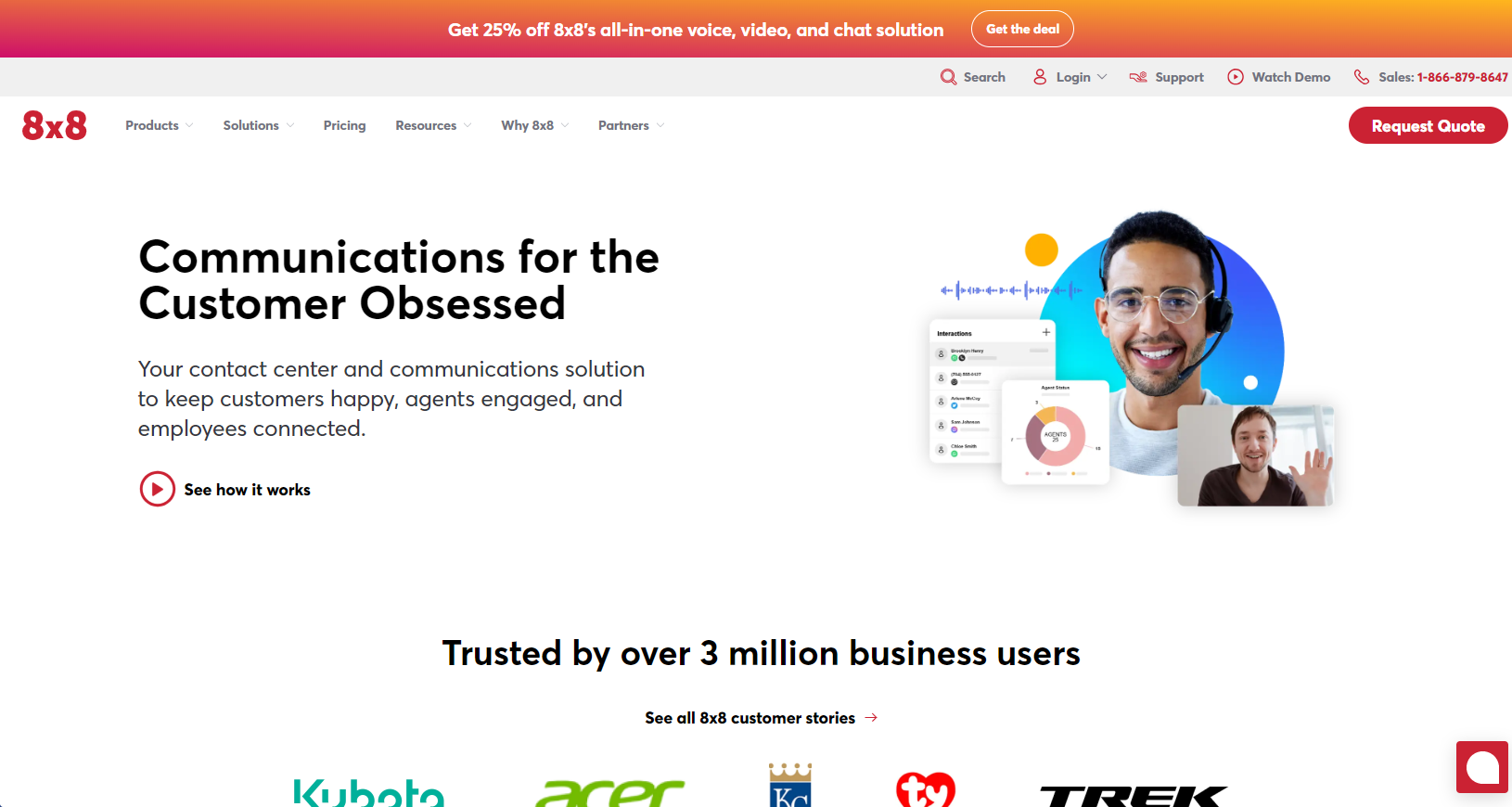
8x8 offers a formidable all-in-one cloud phone system, integrating voice, video call, team chat, and contact center solutions into a single ecosystem. It is heavily focused on providing a truly unified experience for enterprises. Additionally, the 8x8 X Series platform is a cloud-based system for remote workforces, offering UC and contact centre services in tiered packages [5]. While it is a strong contender, it is worth looking at other 8x8 competitors to ensure the best fit.
8x8 Advantages
- Provides a single, integrated platform for both Unified Communications as a Service (UCaaS) and Contact Centre as a Service (CCaaS).
- Backed by uptime service level agreements (SLAs).
- Well-suited for large enterprises with complex, global communication requirements.
8x8 Disadvantages
- Pricing can become complex and is generally higher than many other competitors.
- The vast feature set can be overwhelming for smaller teams to navigate and implement effectively.
3. RingCentral

RingCentral stands as one of the most prominent providers of cloud-based communications and collaboration solutions. Its core offering, RingCentral MVP delivers a suite of tools designed to connect employees and customers across any device, anywhere.
RingCentral Advantages
- Boasts a catalogue of over 300 pre-built integrations.
- Known for its platform architecture.
- Offers international numbers in some countries.
RingCentral Disadvantages
- Can be one of the more expensive options, particularly for small businesses on a tight budget.
- Some features that are standard elsewhere, such as automatic call recording, are often locked behind higher-priced tiers.
4. Nextiva
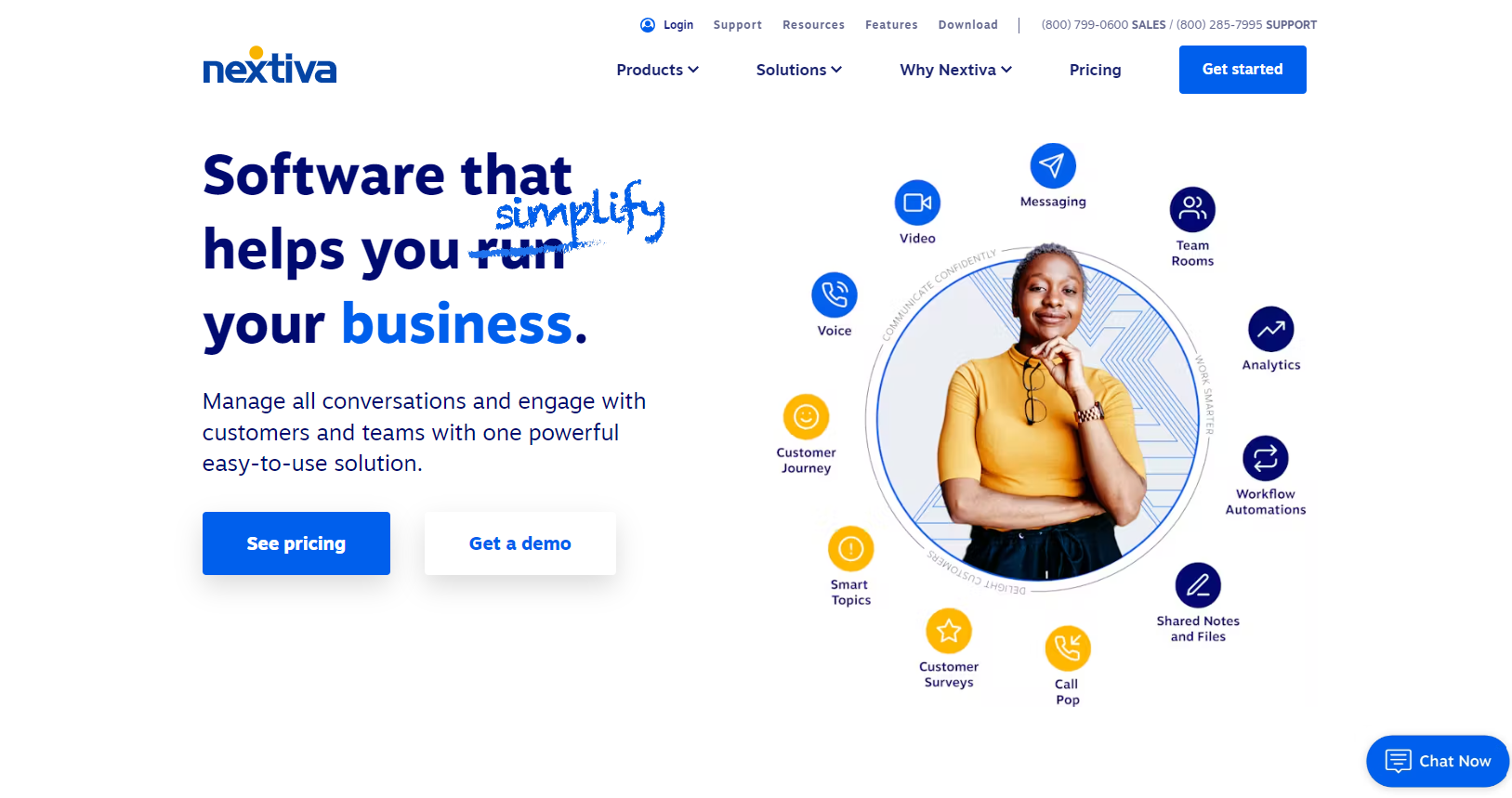
Nextiva positions itself as a VoIP platform which includes business communications, team collaboration tools, and customer management software in one place.
Nextiva Advantages
- Reportedly has a helpful customer support team.
- Combines phone service with foundational CRM-like features.
- Consistently receives positive feedback for its call quality and system reliability.
Nextiva Disadvantages
- "Unlimited" calling plans are typically restricted to the US and Canada, with other international calls incurring per-minute charges.
- The user interface can feel dated when compared to more modern, streamlined solutions.
5. Dialpad

Dialpad is a AI-powered cloud communication platform with AI features similar to Ringover's, like call transcription, sentiment analysis, and automated post-call summaries.
Dialpad Advantages
- Like Ringover, AI transcriptions and summaries are not an add-on but are woven directly into the product experience.
- Features a clean, modern, and highly intuitive user interface across desktop and mobile apps.
- Offers both UCaaS and CCaaS products, enabling businesses to manage all communications through a single vendor.
Dialpad Disadvantages
- Dialpad's prices can be costly. International calling rates can be expensive compared to providers that include it in their plans, like Ringover.
- Customer support experiences have received mixed reviews from users.
6. Vonage

Vonage offers a cloud communications platform with unified communications, contact centre solutions, and a suite of programmable APIs, making it a versatile choice. As you compare business phone systems providers, Vonage often appears as a choice for those needing customisation.
Vonage Advantages
- Extremely customizable through a robust set of APIs, allowing developers to embed communications into custom applications.
- Offers a wide range of features that can be bundled to suit different business needs.
- A strong option for businesses with development resources that want to build unique communication workflows.
Vonage Disadvantages
- Pricing can be opaque and confusing, with many à la carte features that add to the monthly cost.
- The user interface is considered less intuitive and polished by some users.
7. Mitel
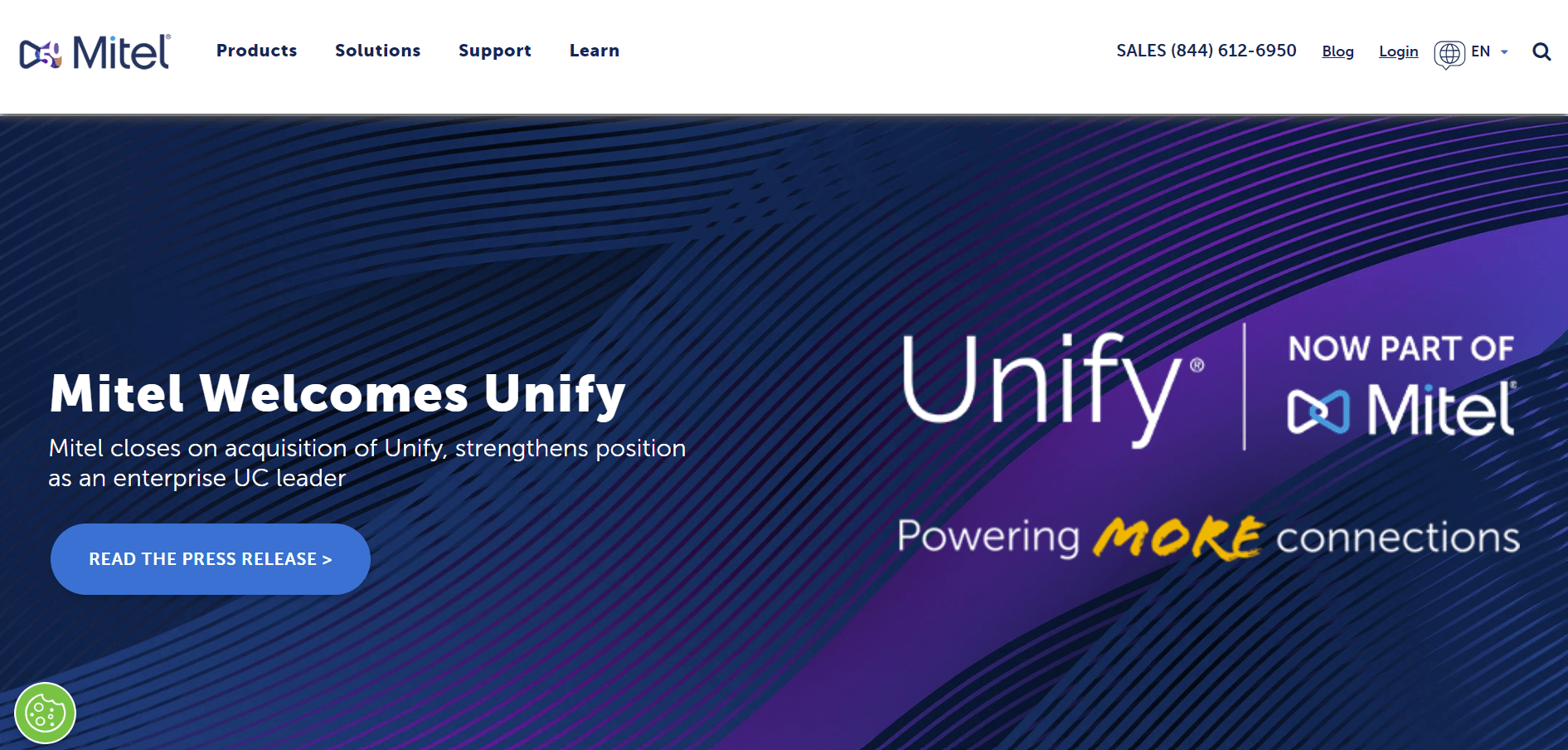
Mitel provides a wide spectrum of solutions, spanning on-premise PBX systems, private cloud, and public cloud-based UC. Its enduring strength lies in its expertise with physical desk phones.
Mitel Advantages
- A strong choice for businesses that need to maintain a hybrid model of cloud services and on-premise hardware.
- Brings decades of deep expertise in the enterprise communications sector.
- Offers reliable and highly scalable solutions proven to work for large, demanding organisations.
Mitel Disadvantages
- Its cloud solutions are often seen as less of a priority compared to its cloud-native competitors.
- Configuration and ongoing management can be complex and may require specialised knowledge.
- Pricing is rarely transparent, typically requiring a custom quote from a sales representative or partner.
8. CloudTalk
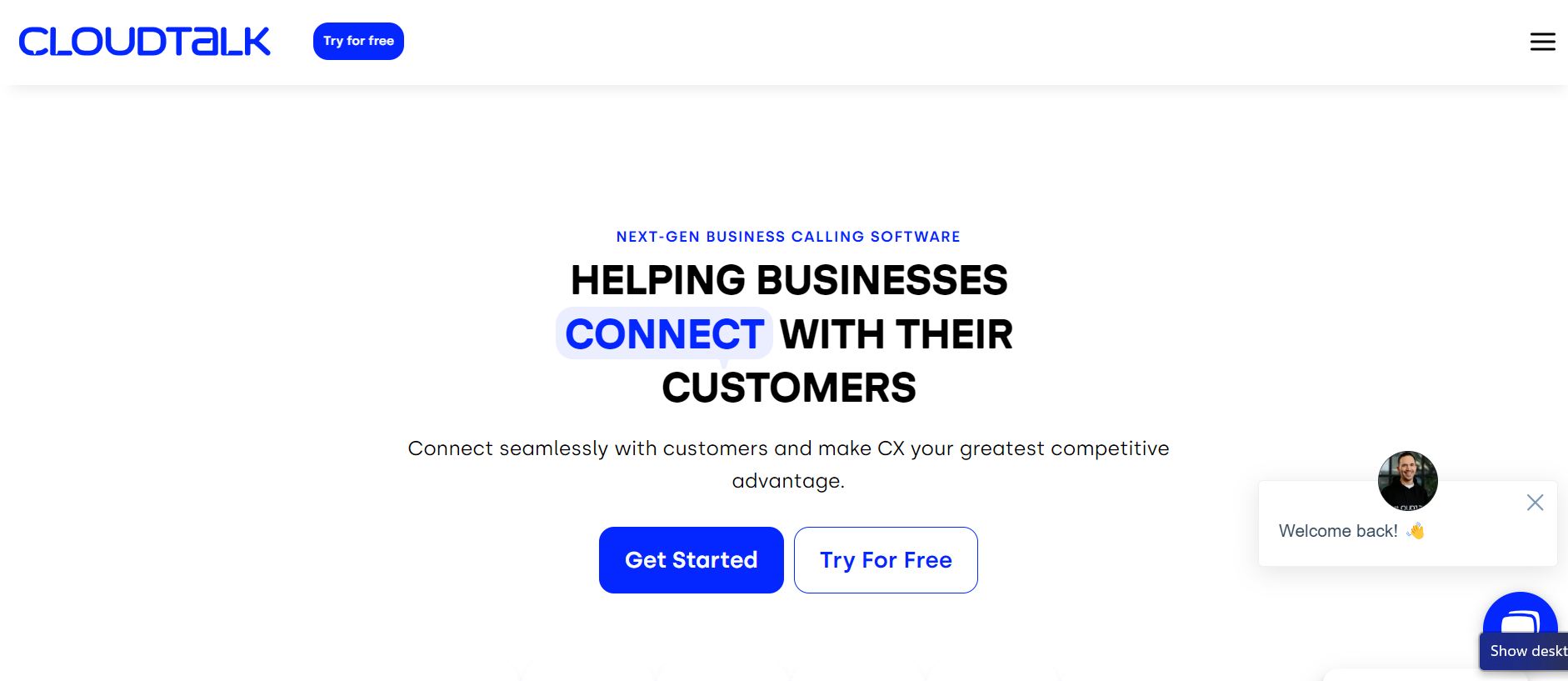
CloudTalk is a VoIP phone system designed specifically with the needs of sales and customer service teams in mind. It is primarily targeted at the small and medium-sized business (SMB) segment, offering a call centre software. CloudTalk pricing is also very typical for similar options on the market.
CloudTalk Advantages
- Provides a good selection of essential call centre features like call queuing, skill-based routing, and call monitoring.
- Offers local phone numbers in many countries.
- The interface is generally considered intuitive and easy for agents to learn.
CloudTalk Disadvantages
- Some users have reported intermittent issues with call quality and software bugs.
- Customer support has been cited as being slow to respond to technical issues.
9. Ooma

Ooma is a communication provider that serves both the residential and business markets. Its business offering, Ooma Office, is tailored for small businesses, aiming to provide a professional phone system without the high cost or complexity of traditional enterprise systems.
Ooma Advantages
- Features some of the most affordable pricing plans on the market, making it accessible for small businesses.
- The setup process is designed to be simple and straightforward.
- Offers a blend of hardware and software to create a complete solution.
Ooma Disadvantages
- The feature set is more basic compared to more robust business communication platforms.
- Offers very limited integrations with other common business tools like CRMs.
- Scalability can be a significant concern for companies experiencing rapid growth.
10. 3CX
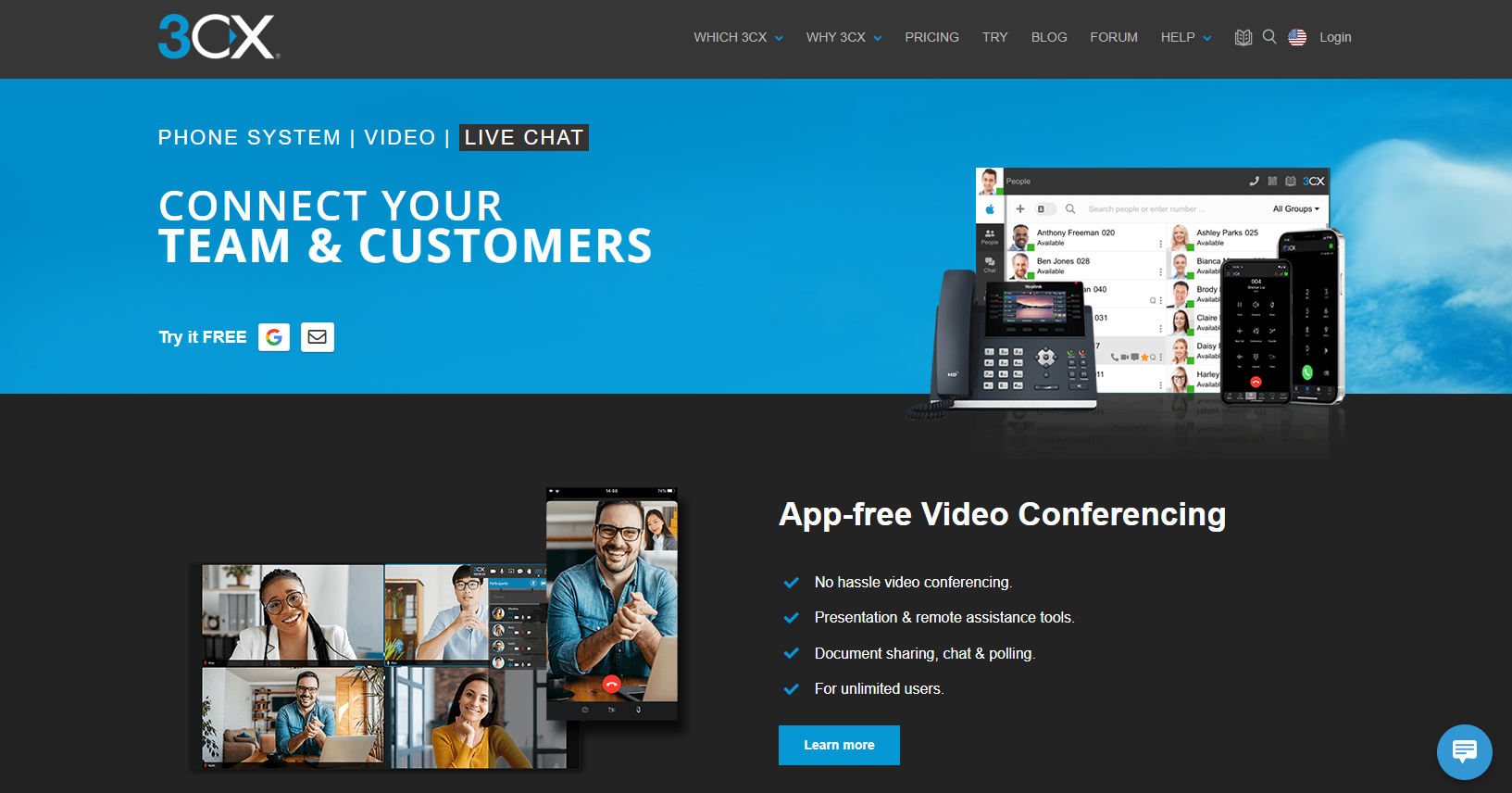
Unlike the other providers on this list, 3CX is not an all-in-one service provider but rather a software-based IP PBX. This means businesses license the 3CX software and are then responsible for arranging their own hosting (either on-premise or in the cloud) and their own SIP trunking for placing calls. While this offers flexibility, exploring 3CX alternatives is wise for those seeking a simpler solution.
3CX Advantages
- Offers a free plan with a solid set of basic features for a limited number of users.
- Highly flexible and customizable, giving technically savvy businesses granular control over their phone system.
- As an open-platform system, it helps businesses avoid vendor lock-in.
3CX Disadvantages
- Requires significant technical expertise or a dedicated IT partner to set up, manage, and maintain.
- Total cost of ownership is complex, as you must budget for the 3CX license, SIP trunking, hosting, and support contracts separately.
- Support is often provided by third-party partners rather than directly from the developer, which can lead to inconsistent service.
What Is Sangoma?
Sangoma is a global provider of Unified Communications (UC) solutions, offering a portfolio that includes both traditional on-premise hardware and modern cloud-based services (UCaaS). Founded in 1984, the company has grown into a major player in the communications space, reporting annual revenues of $236.7 million and employing 645 people [6].
A key part of Sangoma's identity is its role as the primary developer and sponsor of two of the world's most popular open-source communication projects: the Asterisk communications engine and the FreePBX web-based GUI that manages it [7]. This deep connection to the open-source community shapes its target audience, which often includes businesses that require deep customisation, have in-house technical resources, or need to integrate with existing on-premise infrastructure.
Sangoma Pricing
Sangoma's pricing model can be notably complex and varies significantly depending on which of its products a business chooses. The total cost is often an assemblage of multiple components rather than a single fee:
- Hardware: For on-premise setups, this includes the cost of physical desk phones, gateways, and server equipment.
- Software Licenses: While FreePBX is open-source, many advanced features require the purchase of commercial modules. The Switchvox platform has its own licensing fees.
- Subscription Fees: For its UCaaS offerings, Sangoma charges monthly per-user fees, similar to other SaaS providers.
- Support Contracts: Technical support and system maintenance are often sold under separate, annual contracts.
This multi-faceted structure makes it difficult to predict the total cost of ownership, a reality that drives many businesses to seek alternatives with more straightforward and predictable pricing.
Ringover’s thoughtful selection of plans ensures that business of every size can find the right fit–and that Ringover can grow with you!
Why Switch from Sangoma?
You Need an Easy-to-Use Solution
Sangoma's heritage is deeply rooted in open-source projects like Asterisk and FreePBX. This DNA gives its solutions immense power and flexibility, but also brings inherent complexity. Proper configuration and management often require significant in-house IT expertise or a paid partner support contract. This stands in stark contrast to modern, cloud-native alternatives like Ringover, which offer an intuitive interface that can be deployed in minutes by non-technical users. For many organisations, including the top VoIP providers for small businesses, simplicity and speed are paramount.
You Need International Service
While Sangoma offers international capabilities, its primary market focus has historically been North America. For businesses with global teams or international customers, setting up numbers in multiple countries or managing calling plans can be more complex and costly. Alternatives that were built with a global mindset from the ground up often include unlimited calling to a long list of countries and instant acquisition of international phone numbers as part of their standard plans, simplifying global expansion.
You Need to Enhance Productivity with Integrations
While Sangoma does offer integrations with business software, the setup process can sometimes be manual, requiring technical configuration. Modern competitors, on the other hand, provide a wide range of seamless, pre-built integrations with popular CRM and business tools that can be activated in a few clicks. These deep integrations unlock massive productivity gains through features like automatic contact synchronisation, click-to-call functionality directly within the CRM, and automated logging of every call and text message, eliminating manual data entry.
You Need an Affordable Solution with Straightforward Pricing
The total cost of a Sangoma system can be difficult to calculate, with separate and often recurring charges for hardware, software add-ons, and support. This model contrasts sharply with the transparent, all-in-one subscription models that have come to define the SaaS industry. Market analysis indicates an accelerating shift toward cloud solutions with predictable, subscription-based pricing models [1]. Providers like Ringover offer clear, per-user, per-month pricing that includes unlimited calling, advanced features, and full support, making budgeting simple and predictable.
What Is the Best Sangoma Alternative?
The decision to seek a Sangoma alternative often stems from a few key drivers: a desire to escape complexity, a need for transparent and predictable pricing, and a demand for more seamlessly integrated features like global calling and deep CRM connections.
For most businesses, especially those focused on driving growth through their sales and customer support teams, Ringover stands out as the best Sangoma alternative. It directly addresses the primary challenges of a Sangoma system while delivering exceptional value.
Ringover's core advantages create a compelling case:
- Simplicity and Ease of Use: A quick setup and an intuitive interface empower every user, regardless of technical skill.
- Transparent Pricing: All-inclusive plans cover unlimited calling, advanced features, and support, with no hidden costs.
- Global-Ready: Unlimited calls to over 110 destinations and easy access to international numbers are built-in.
- Powerful Features: Built-in productivity tools, deep CRM integrations, and advanced analytics are included to help your team perform at its best.
While you must assess your organisation's specific needs, Ringover offers a powerful combination of simplicity, capability, and value. It provides the advanced features of an enterprise-grade system with the ease and predictable cost of a modern SaaS platform.
To see how a truly unified and intuitive communication platform can transform your business, explore our business VoIP provider options and start a free trial of Ringover today.
Citations
- [1]https://my.idc.com/getdoc.jsp?containerId=US52083224
- [2]https://ringover.co.uk/blog/ringover-alternatives
- [3]https://growjo.com/company/Sangoma
- [4]https://ringover.co.uk/blog/8x8-competitors
- [5]https://techtarget.com/searchunifiedcommunications/feature/Explore-unified-communication-products-for-your-organization
- [6]https://owler.com/company/sangoma
- [7]https://saashub.com/freepbx-alternatives
Published on November 20, 2025.


